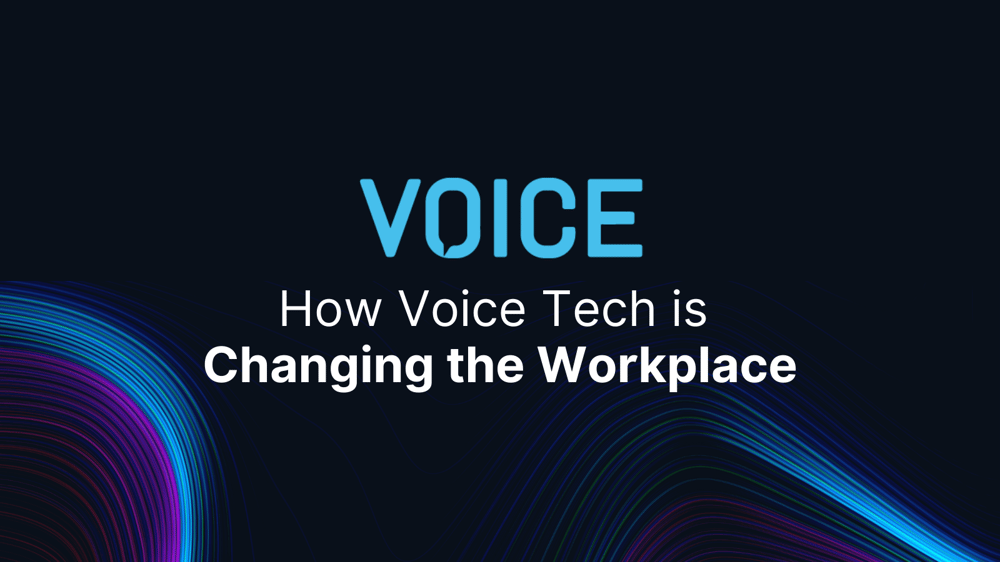How Voice Tech is Changing the Workplace
Modev News VOICE Summit 22-04-18 Modev Staff Writers 4 min read

Voice tech is already pretty ubiquitous. That statement is definitely true today and will likely remain that way for a long while. Voice tech is still in its infancy, and it's poised for substantial and continued growth. Voice tech will become more and more visible in places we aren't used to seeing it. One environment where the presence of voice assistants is growing is the workplace - the office.
That may appear counterintuitive to some at first because voice tech's primary uses thus far have been entertainment and leisure-focused. However, there are several key ways voice tech can be used in the workplace to augment productivity, keep key staff members focused on what's important, promote better communication, and create new opportunities within your organization.
This post looks at some of the ways voice tech will change the workplace - for the better.
Automating low-value tasks adds value to your workforce
"While voice technology is used mostly for simple tasks today, like playing music, asking about the weather, or adding items to a shopping list, the technology has clear benefits that can help employees increase productivity and efficiency."
The above quote is from Steve Stove, VP of products and strategy at SolarWinds. He echoes what I stated in my introduction, and he's quite correct.
With their automation capabilities, voice assistants really have the potential to bring about meaningful changes in the day-to-day of almost everyone making up the workforce. A simple example of this potential will appear to be pretty low-level, but its impact is significant (and adds up quickly). I'm talking about scheduling.
Imagine having a workforce where each employee has access to a smart assistant to handle the scheduling of their meetings at the behest of a simple voice command. If there's a scheduling conflict, the assistant will promptly notify the employee and propose alternate times. The employee can then confirm the meeting using their voice. No need to stop what they're doing to tick boxes or press buttons in an app. Of course, the time saved in this example may only be a few minutes. Still, those minutes quickly add up, especially when you begin to consider all of the low-level tasks that are part of a typical workday, such as finding an open conference room, reporting on an equipment problem, ordering more office supplies, etc.
Not only will voice tech give you a boost in productivity but your employees' days won't be filled with minutiae. They can focus on what's essential, on the tasks they were hired to perform, on what they enjoy. A (welcome) collateral effect of voice tech will be to augment your workforce's engagement and professional satisfaction.
Voice tech improves communication in the workplace
Voice assistants' advanced use of AI-based natural language processing (NLP) makes them particularly well-suited to help business professionals communicate and collaborate more and more effectively.
An example of this would be a smart assistant automatically taking notes for participants during a meeting. That's already a step up, but that's not all. With proper training, your AI-based smart assistant could even identify key points from the conversation that require a follow-up. It could propose specific actions that should be undertaken and specific people within the organization that should be contacted regarding X or Y issues that the smart assistant identified.
Another way voice assistants can promote good communication in the workplace lies in their ability to quickly process massive amounts of data and output the most relevant information for a given meeting or project. Lowering the barrier of access to pertinent information makes data-driven decision-making easier and greatly helps businesses better navigate the market.
Voice tech promotes accessibility in the workplace and provides new opportunities
Some employees may have difficulty with certain technologies. It could be due to a physical disability - and we've already seen what voice tech can do for the visually impaired, the elderly, and those with reduced mobility. Or it could be because the end user's tasks do not allow for the use of a keyboard.
In these cases, voice assistants could help them accomplish their daily tasks more easily without requiring a pair of hands or eyes. As senior analyst at 451 Research, Raul Castañon-Martinez says, "Speech-enabled assistants provide the flexibility to choose the best fit for human-computer interactions and open up many possibilities for use cases and applications where data entry remains a challenge."
And this also means that voice tech in the workplace could even open up some employees to new tasks and even new roles that may not have been possible without voice-enabled UIs. Some members of your workforce will discover new skills and aptitudes they may not even have known they possessed, which will, in turn, add some upward mobility to your organization. Who can complain about that?
Wrap up
The world is changing. And voice tech is part of that change. As it continues on its growth trajectory, we can expect to find voice tech in more and more environments - the workplace being one of them. And the changes it promotes will create a more productive, open, and informed world - all through the power of voice.
About Modev
Modev was founded in 2008 on the simple belief that human connection is vital in the era of digital transformation. Today, Modev produces market-leading events such as VOICE Global, presented by Google Assistant, VOICE Summit, and the award-winning VOICE Talks internet talk show. Modev staff, better known as "Modevators," include community building and transformation experts worldwide. To learn more about Modev, and the breadth of events offered live and virtually, visit modev.com.